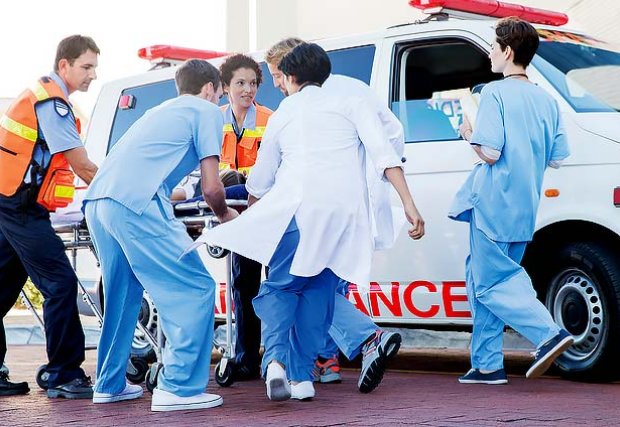Wellington Regional Medical Center (WRMC) and the Emergency Medical Services (EMS) teams in our community have a long history of working together to support the best possible patient outcomes. Pre-alert notifications play a key role by helping EMS staff notify Emergency Department (ED) physicians of life-threatening situations so they can be ready when patients arrive at the hospital, says Jessica Banks, RN, EMT-P, staff captain of the medical services division for Palm Beach County Fire Rescue (PBCFR).
Here are four key areas where WRMC is teaming up with EMS to deliver rapid, quality care.
Advanced stroke care
WRMC has been named a Certified Advanced Primary Stroke Center by The Joint Commission, and is designated a Comprehensive Stroke Center by the Florida Agency for Health Care Administration (AHCA). It is one of only 40 hospitals in Florida and five in Palm Beach County to earn the AHCA accreditation, which ensures that the hospital complies with the highest standards in clinical practice guidelines, performance measurements and continuous improvement programs for stroke patients. It is also the only hospital in Central Palm Beach County to offer advanced neurointerventional services, demonstrating expertise in stroke care.
ED Assistant Medical Director Brandt Delhamer, MD, says, “We’ve partnered with EMS and they let us know as soon as they see a patient who has had a possible stroke.” This allows physicians in the emergency room to expedite testing and treatment because every second counts. The advanced stroke services at Wellington Regional have “really had a significant impact on the lives of citizens in the western communities,” says Richard Ellis, PBCFR division chief of medical services.
Comprehensive cardiac care
WRMC is also the only hospital in Palm Beach County to be awarded Chest Pain Center Accreditation with Primary PCI and Resuscitation from the American College of Cardiology (ACC). This means patients have access to advanced treatments, including potentially life-saving hypothermia therapy after cardiac arrest and the Impella® heart pump in select cases. If paramedics suspect a possible heart attack, they can perform an EKG test in the field and transmit the results immediately to ED physicians via a secure line, so that teams can coordinate care in real time.
Sepsis
Emergency protocols are in place that allow EMS staff to quickly recognize sepsis, a potentially fatal blood infection that can especially affect older adults. EMS teams immediately convey information about sepsis to the hospital. “We’ve recognized that if we can have EMS start treating on the scene and continue treatment in the ED, these patients can do much better,” Dr. Delhamer says.
Fractures
The Fracture Program at WRMC expedites care for patients who experience broken or fractured bones due to falls, equestrian injuries and other sports-related injuries. The faster the fracture is repaired, the better the recovery and less risk of complications, says Adam M. Bromberg, MD, medical director of the ED, and an assistant medical director for Greenacres Fire Rescue.
“Our doctors in the ED have been together for 15 years,” says Dr. Bromberg. With this longevity, they’ve developed strong relationships with EMS personnel, which help enable high-quality care and stabilization for patients.
Ellis and Banks say they are grateful for the support of Wellington Regional, where PBCFR transferred over 8,000 patients in 2017.
“They have a commitment to the community to supporting the best possible patient outcomes, and we feel that,” Ellis says.
Teaching moments
Each year WRMC hosts a three-day symposium where emergency physicians, paramedics and other EMS staff meet to discuss how they can work together to benefit patients. Additionally, physicians regularly discuss patient care and provide feedback to EMS staff about outcomes. This follow-up is both an educational opportunity and a chance to recognize first responders for what they do, says Dr. Delhamer. “We want them to know, what you did saved this person’s life.”

